274 Products
-
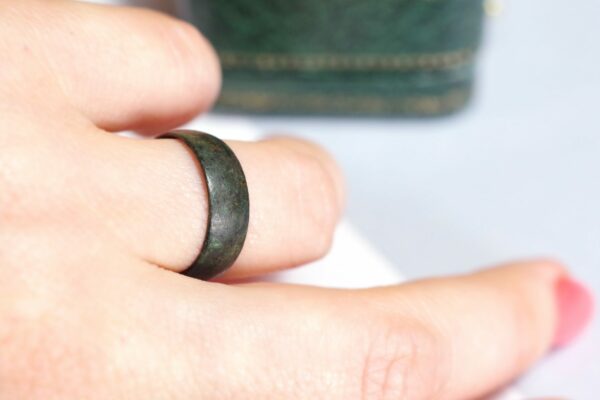
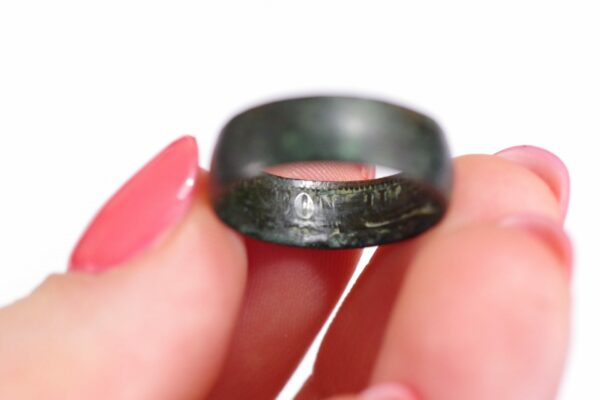 Out of Stock
180,00€
Out of Stock
180,00€Commemorative ring Napoleon III Emperor. This is a simple ring in bronze. On the inside, it bears the inscription “Napoleon III Emperor”. The message is highlighted by a dotted frieze. The inscription is partially faded. This is due to the wear and use of the ring by its former wearer. Some rare models of this ring exist with the date “1863”. Memorial jewel, circa 1860.
Finger size: 51 EU or 5.5 US (no sizing possible)
Ring width : 5 mm
Weight : 1,99 gr
*The antique box is not sold with the jewel*
-
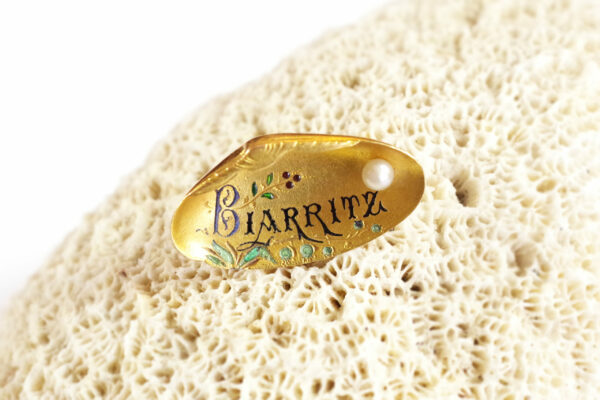
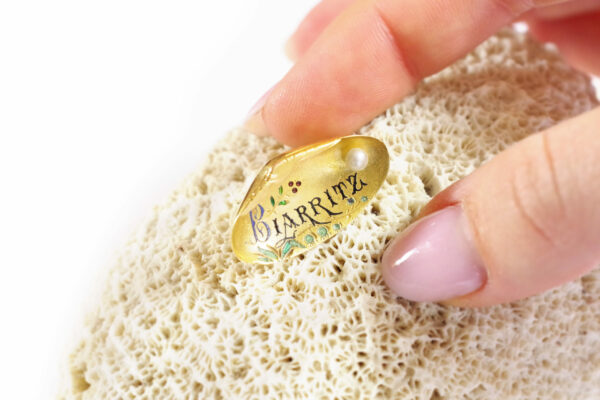 450,00€
450,00€Biarritz Art Nouveau brooch in yellow gold 9 karat. The brooch takes the form of a shell (a mussel) on which it is written “Biarritz” in black and blue enamel. Around, a floral decoration colored by green enamels and a pearl inlaid in relief. Brooch of the early twentieth century, Art Nouveau period. French jewel.
Trefoil hallmark
Dimensions: 1.4 x 2.6 cm
Size of the pearl: 3 mm approximately
Note: the fastening system works.
Weight: 4,11 gr
Historical point: since 1784, the sea baths of Biarritz are in fashion and Napoleon bathes there in 1808. Later, the Empress Eugenie, who came several times with her family, convinced her husband Napoleon III to make it their holiday resort. Following the construction of the Biarritz salt baths, the city experienced a great boom in the years 1900-1920 thanks to the international tourism that developed there. Coco Chanel opened her 3rd boutique there in 1915.
-
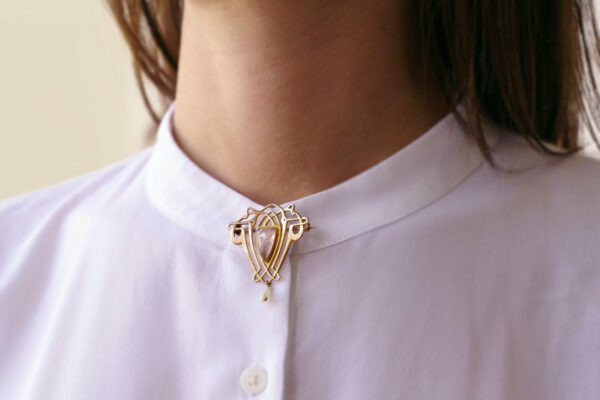
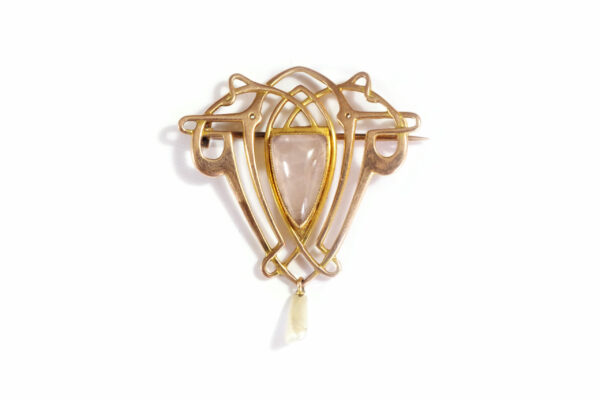 580,00€
580,00€Arts & Crafts brooch by Barnet Henry Joseph (1865-1929), in rose and yellow 9 karat gold. The brooch has a triangular shape and is composed of openwork interlacing. It is a typical pattern of English Art Nouveau movement, also called Arts & Crafts. In the center, a pink quartz cabochon adorns the piece in a serrated setting. The composition is decorated with a fine elongated pearl (not tested), also called a soufflure. English brooch made by Henry Joseph Barnet, circa 1910.
Signed BHJ on the reverse. Trefoil hallmark
Dimensions : 4 cm x 3,5 cm
Weight : 4,93 gr
B.H. Joseph & Co, a jewellery manufacturing and selling company, was started by Barnet Henry Joseph and his brother Henry Joseph in 1865 in Birmingham. From 1878, B.H. Joseph & Co opened showrooms in London and was considered one of the most famous jewellery houses. They made many designs and this pendant is a good example of an Arts & Crafts style.
-
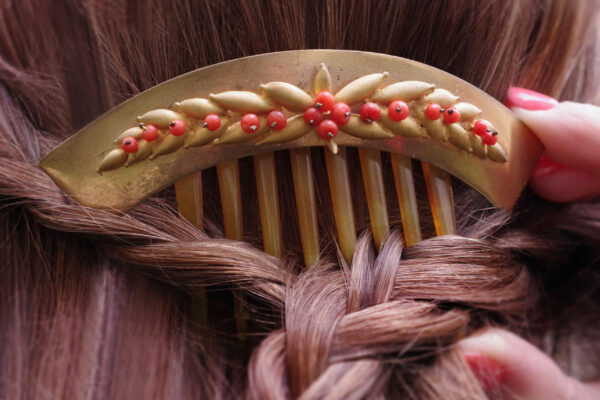
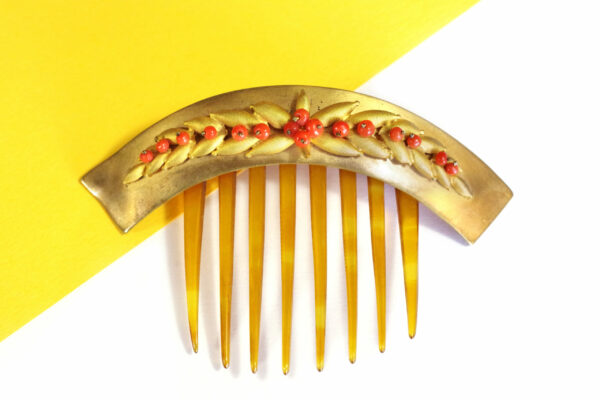 450,00€
450,00€Victorian coral wedding comb in golden metal with 8 teeth. The comb’s teeth are made of blond corn. The upper part moves. It is decorated with two golden and matte wheat ears, with sixteen orange to red coral beads. 19th century tiara comb, Victorian period, French Napoleon III period.
Height : 7,4 cm
Width: 11 cmCondition : traces of oxidation
Weight : 28,59 grAuthentic head jewel, this 19th century hairstyle accessory will adorn and sublimate your hair and give it a romantic final touch.
Gemological point: it is a gem of organic origin. Only the branched calcareous trunks of certain corals are used in jewellery. Its colour is due to organic pigments close to carotene: varying from blood red to white, passing by the pink “angel skin”.
Fashion point: in the 19th century, women wore their hair in twists on the top of their heads and in curls, hanging from each side of the face. They added a comb, flowers, leaves or jewelled ribbons to their hairstyle.
-
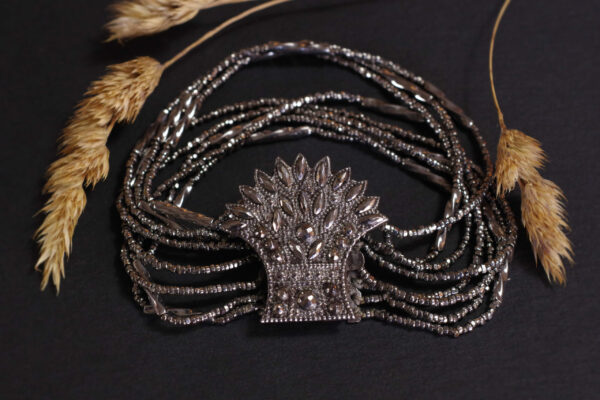
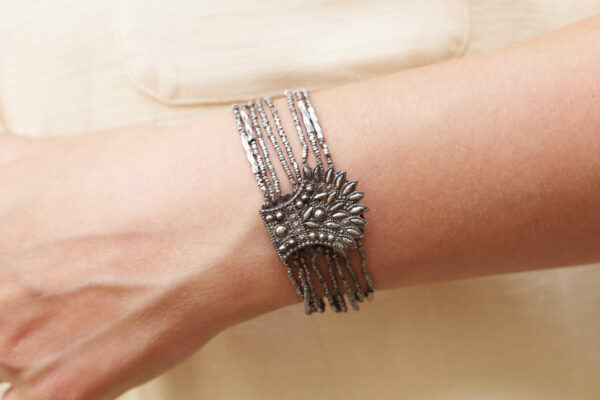 690,00€
690,00€Georgian cut steel polished bracelet dating from the first part of the 19th century. Bracelet with eight rows of steel beads of round and oblong shape. The pearls are faceted making the light shimmers. The clasp is in the form of a stylized bouquet of flowers, decorated with faceted and riveted steel studs. Antique bracelet from the early 19th century, circa 1830.
Total length: 17,7 cm
Clasp size: 3 cm x 3 cmNote: good general condition, trace of oxidation
Weight : 19,83 gr
*The antique box is not sold with the jewel*
-
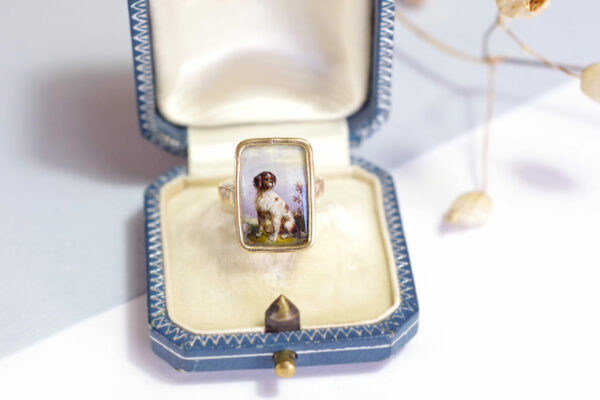
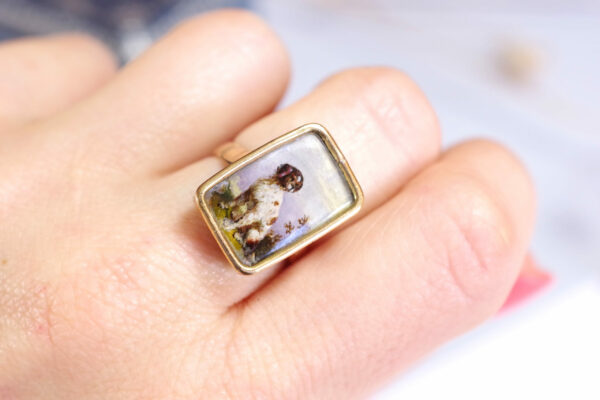 1980,00€
1980,00€Victorian Spaniel brittany dog ring in rose gold 9 karats. Antique ring with a painted miniature, showing a sitted dog, looking to the right. It is most probably a hunting dog, Spaniel Brittany type. The miniature is painted on a white background (it could be ivory or vellum). 19th century ring, Victorian period, probably from England.
Clover hallmark (later add)
Finger size : 50 EU or 5,5 US (possible sizing)
Dimensions of the ring head : 1,8 x 1,3 cm
Conservation : this ring is very old and has a miniature, it should not be worn near water (shower, washing up, bathing)
Condition: good general condition of the miniature. Some iridescence visible under the paint. Traces of oxidation, traces of soldering on the ring.
Weight : 3,32 gr
*The antique box is not sold with the jewel*
-
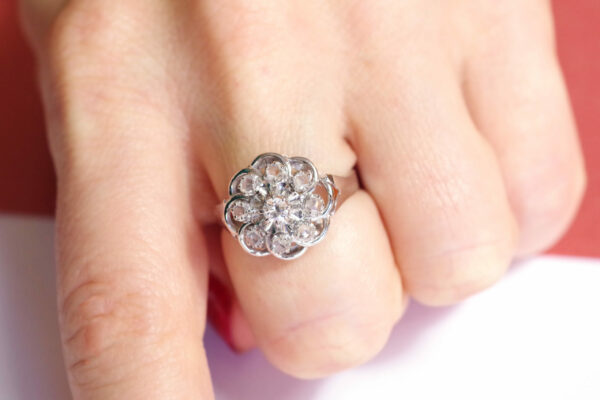
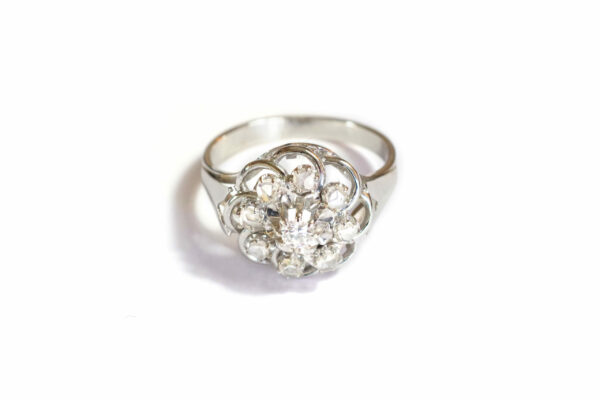 830,00€
830,00€Diamonds flower cluster ring in white gold 18 karats. The bezel of the ring is openworked and forming short volutes simulating petals of a flower. In the centre, a brilliant-cut diamond is surrounded by eight rose-cut diamonds, all set with prongs. French jewel from the middle of the 20th century.
Eagle head hallmark
Finger size: 52 EU or 6.25 US (can be cut to size)
Diameter of the ring head : 13 mm
Estimated weight of the central diamond : 0.10 carat
Total estimated weight of the diamonds : 0.34 caratNote : good condition of the diamonds
Condition : wearsWeight : 3,72 gr
*The antique box is not sold with the jewel*
-
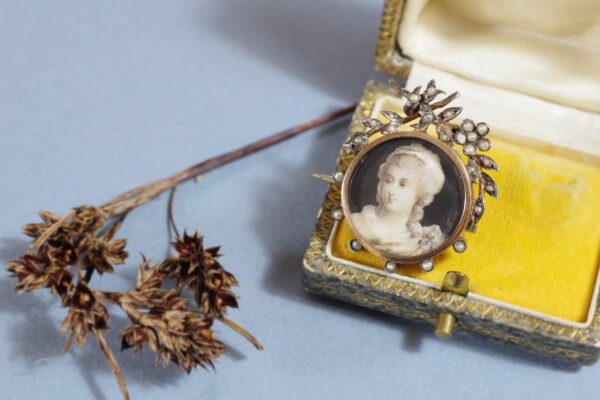
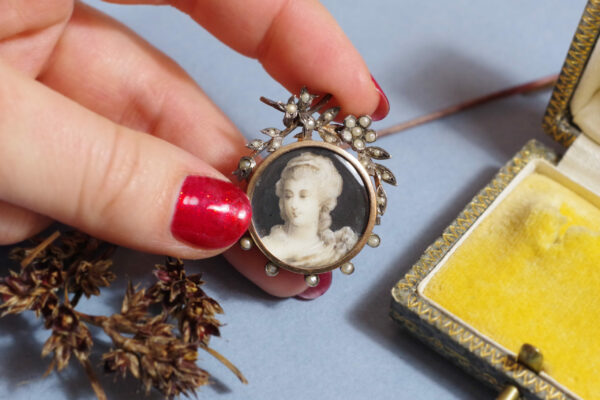 340,00€
340,00€Victorian grisaille brooch miniature in 18 karat rose gold and silver. Of circular shape, a lady’s portrait dressed as in 18th Century fashion is painted in grisaille (different shades of greys). The portrait is encircled by a rose gold circle, two branches with flowers inlaid with pearls cross each other on the upper part of the jewel. Six pearls decorate the contour of the brooch to highlight the lovely portrait. Antique brooch from the Victorian period, 19th century.
Swan and owl hallmarks
Height: 3,1 cm
Width: 2.8 cmNote: the fastening system works.
Condition: oxidation, wears, soldering to keep the compartment locked.Weight : 7,56 gr
*The antique box is not sold with the jewel*
-
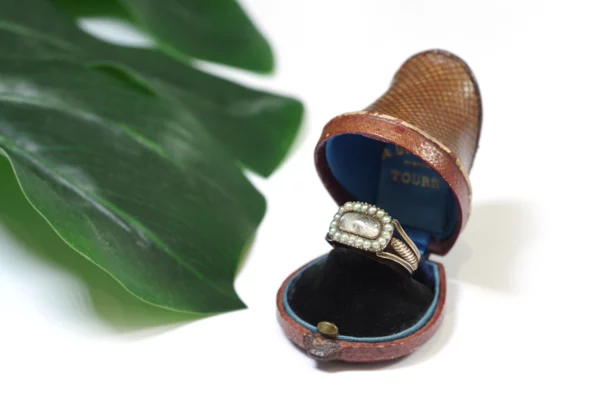
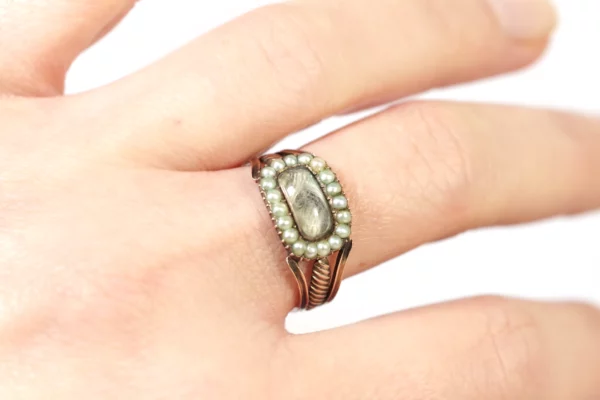 620,00€
620,00€Georgian mourning ring in 10k pink gold. This a sweet oval locket ring holding a braid of hair enclosed behind crystal. The braid is surrounded by a halo of 19 pearls and the panel is sat upon a delicate band separated into 3 openwork strands. The inscription : « Elizabeth Yve ob 2 sept.1810 aet 79 » inside the ring, indicating the date of death and the age of the personn. Jewel from the beginning of the 19th century.
Trefoil hallmark (French State hallmark for 9-karat gold)
Finger size: 59 EU or 8,75 US (adjustment possible)
Ring Head Size: 9 x 13 mm
Condition: chips on the glass
Weight: 3,43 gr
*The antique box is not sold with the jewel*
-
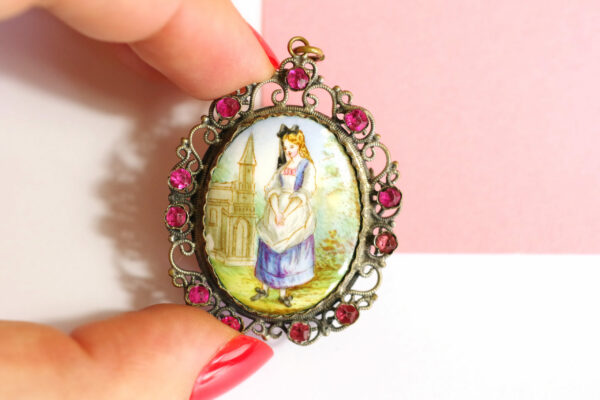
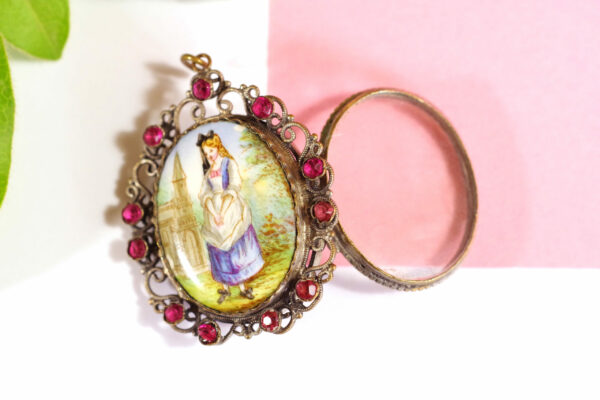 270,00€
270,00€Victorian French locket pendant in silver plated. An enamelled ceramic plate adorns the center of the pendant. It represents a woman in traditional regional costume, with her head bowed and her hands crossed, in front of the village church. Her traditional costume let us think that the woman is from Alsace, East of France, because of the large black bow which was worn here at this period.
Red glass stones surround the figure in a set of filigree. At the back, the locket opens to hide a lock of hair or a photograph of the loved one.
Height: 4.3 cm
Width: 3.1 cm
Condition: slight lack of the enamel on the left side of the ceramic.
*The antique gold chain is not sold with the jewel*
